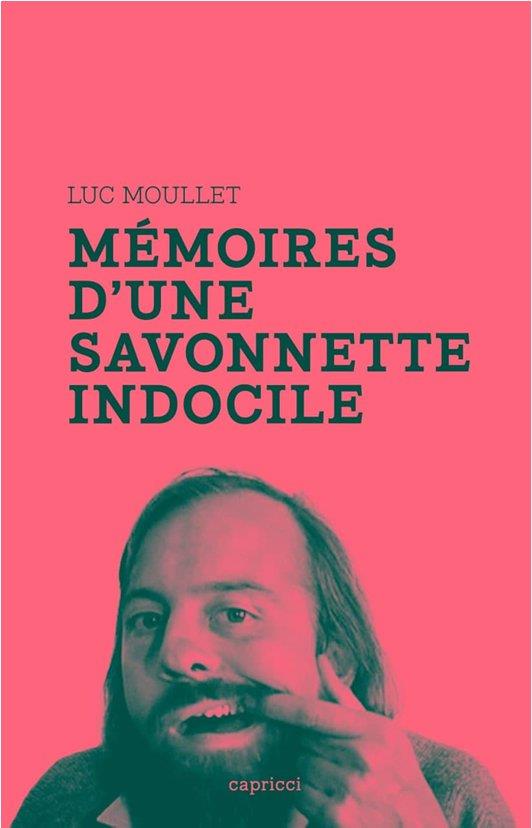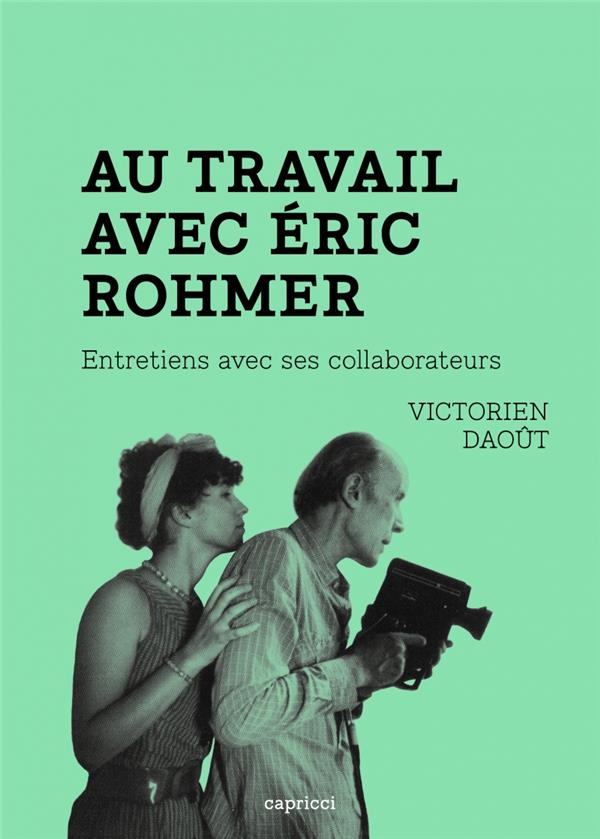Portraits in Cinema: Akerman, Moullet, Loden, Rohmer

Cinema, like literature, is often described as an art of projection. But what happens when the camera lingers too long—when it doesn’t just capture the image, but holds it, questions it, resists its resolution? This summer, we invite you to read and watch in tandem: to enter the rooms, corridors, and landscapes haunted by four fiercely idiosyncratic filmmakers, as interpreted and refracted by four equally singular writers.
Each title in this list offers a new way to approach the cinema—not as spectacle, but as a lived and intimate process. These are texts that understand film as a porous form: part diary, part method, part disappearance act.
In conjunction with this reading list, we’re thrilled to announce a summer film retrospective celebrating the work of these four directors: Barbara Loden at Anthology Film Archives, Luc Moullet at Film at Lincoln center, , and Éric Rohmer at Metrograph. In the meantime, let the reading begin.
Image copyright: courtesy of Cinema Guild.
Reading List

What does it mean to be held captive—by another person, by your children, by your writing, by art? In La Captive, novelist and critic Christine Smallwood offers a sharp, unguarded meditation on Chantal Akerman’s haunting 2000 film of the same name, itself a loose adaptation of Marcel Proust’s The Prisoner. Published as part of Fireflies Press’s Decadent Editions series, Smallwood’s essay is at once a work of film criticism, memoir, pandemic diary, and artistic reckoning.
Composed during COVID lockdown in a Brooklyn apartment crowded with young children, construction noise, and sleepless nights, La Captive becomes as much about Smallwood’s own forms of domestic confinement as it is about Akerman’s formal corridors and Proust’s controlling narrator. Rather than analyze from a distance, Smallwood lets herself be captured—by the film, by her frustrations, by her subjectivity—and folds Akerman’s meditation on gender, obsession, and possession into her own lived textures of motherhood, writer’s block, and artistic longing.
In Akerman’s work, the camera is a frame that holds and unsettles; in Smallwood’s, the voice—tender, funny, maddened, precise—is the holding form. “A secret can, or should, never be revealed,” Akerman once said. But Smallwood reveals all. The result is a rich and layered document of one artist reckoning with another, of one captivity making space for others. A pocket-sized powerhouse for lovers of hybrid criticism, feminist cinema, and the strange comfort of being seen in our confinement.
La Captive by Christine Smallwood, Fireflies Press, 2024
Click here to purchase this book with us.
“Without Franco, I wouldn’t be here, nor this book. Thank you, Francisco. It’s the only good thing you did in your life.” So begins Luc Moullet’s irresistible memoir—a work as slippery, sharp, and unexpectedly moving as its title, Mémoires d’une savonnette indocile, suggests.
Published by Capricci more than a decade after it was first announced (and originally meant to appear posthumously), this riotously candid autobiography by the so-called “prince of shoestring cinema” reads like a director’s commentary track to a life well-lived at an angle. With 42 brisk and hilarious chapters, Moullet charts his path from cinephilic recluse to enfant terrible at Cahiers du cinéma, from delighted amateur to defiantly unserious filmmaker, offering trenchant, often laugh-out-loud takes on Truffaut, Godard, Bazin, Chabrol, and others along the way.
But Mémoires isn’t just a parade of Nouvelle Vague gossip (though there’s plenty of that—it’s worth the price of admission for Moullet’s thoughts on Positif critic Michèle Firk alone). It’s also a refreshingly unromantic meditation on creativity, class, and survival. Moullet discusses filmmaking not in terms of vision or transcendence, but of budgets, loopholes, and lunch money. He turns financial self-deprecation into an art form, recounting decades of cinematic hustle—filming in nine days a year, dodging taxes, reusing school notebooks, even going nude to save on laundry.
And yet behind the farce lurks something radical: a lifelong refusal to play by the rules, cinematic or otherwise. From absurdist pseudo-documentaries to pataphysical psychodramas, Moullet has never made the same film twice. His memoir, too, is a marvel of tonal shapeshifting—at once confessional, evasive, petty, generous, self-skewering, and totally inimitable.
If you believe cinema can be a form of mountaineering, if you’ve ever wondered how to get your movie funded by faking a cocktail party, or if you simply want to see the Nouvelle Vague from the vantage of its most unruly soap—this is the book for you.
Mémoires d’une savonnette indocile by Luc Moullet, Capricci, 2024
Click here to purchase this book with us.
What begins as a straightforward encyclopedia entry becomes a haunting investigation into disappearance, obsession, and the ambiguous spaces women occupy—in life, in film, and in memory. In Suite for Barbara Loden, French writer and curator Nathalie Léger sets out to profile the American actress and director Barbara Loden, best known for Wanda, her sole feature film. What unfolds is a genre-defying work of literary nonfiction that blurs the lines between essay, biography, autofiction, and criticism.
Drawn to Wanda’s protagonist—a woman so passive she seems to dissolve into the coal-dusted Pennsylvania landscape—Léger doesn’t just analyze the film. She immerses herself in its making, its real-life inspiration, and the woman behind it all. She travels to the Rust Belt, calls prison officials, tracks down the echoes of Loden’s brief, flickering career. She also begins to see herself in Loden—in her artistic solitude, her contradictions, her quiet acts of defiance.
Léger’s pursuit of Loden is not tidy, nor is it objective. It spirals: into archival cul-de-sacs, remembered teenage humiliations, questions about female agency, and meditations on whether lives like Loden’s—or Wanda’s, or her own—are “worth” the telling. And yet, by stubbornly refusing to “stick to the subject,” Léger delivers a book of uncanny emotional precision, one that insists on attention to what is overlooked, discarded, unheroic.
Bleak and dreamlike, unsparing and tender, Suite for Barbara Loden is a hypnotic encounter between two women across time. In Léger’s hands, failure becomes a method, obsession becomes a compass, and the act of writing becomes an act of rescue.
Suite for Barbara Loden by Nathalie Léger, translated from the French by Natasha Lehrer and Cécile Menon (Les Fugitives / Dorothy Project)
Click here to purchase this book with us.
“I can’t look. I can’t ask her to do that.” On the set of Love in the Afternoon, Éric Rohmer asks actor Bernard Verley to direct a nude scene with Zouzou. The anecdote is tender, disarming, and wholly revealing: the man whose films revolve around longing and hesitation was himself a model of modesty and restraint.
In Working with Éric Rohmer, Victorien Daoût interviews over fifty of Rohmer’s close collaborators—actors, technicians, friends. From these many voices emerges a vivid, often surprising portrait of the director of the Moral Tales. Françoise Fabian remembers him as a wild rock’n’roll dancer; Laurence de Monaghan as “a very intimidating man because he was so shy.” Rohmer, ever true to himself, preferred to listen at length to his actors rather than direct them head-on.
His cinema, which actor Fabrice Luchini describes as “a cinema of desire as erotic engine, without consummation,” is built around what is left unsaid: glances, delays, polite evasions. And it’s precisely this attention to the process, to method, to the quiet workings of creation, that Daoût captures so gracefully in this engaging and anecdote-rich volume.
Highly recommended alongside Éric (l’ami Rohmer), a brief and affectionate essay by actress Rosette (Éditions de Paris–Max Chaleil). Two tender tributes to a filmmaker who, more than directing, knew how to accompany.
Au travail avec Éric Rohmer by Victorien Daoût, Éditions du Rocher
Click here to purchase this book with us





